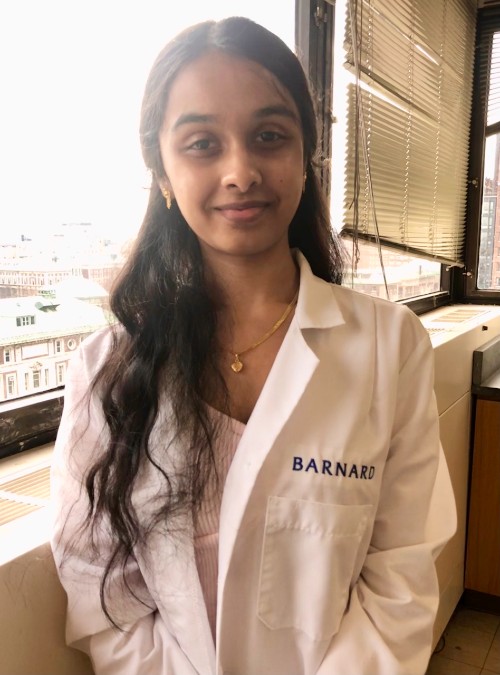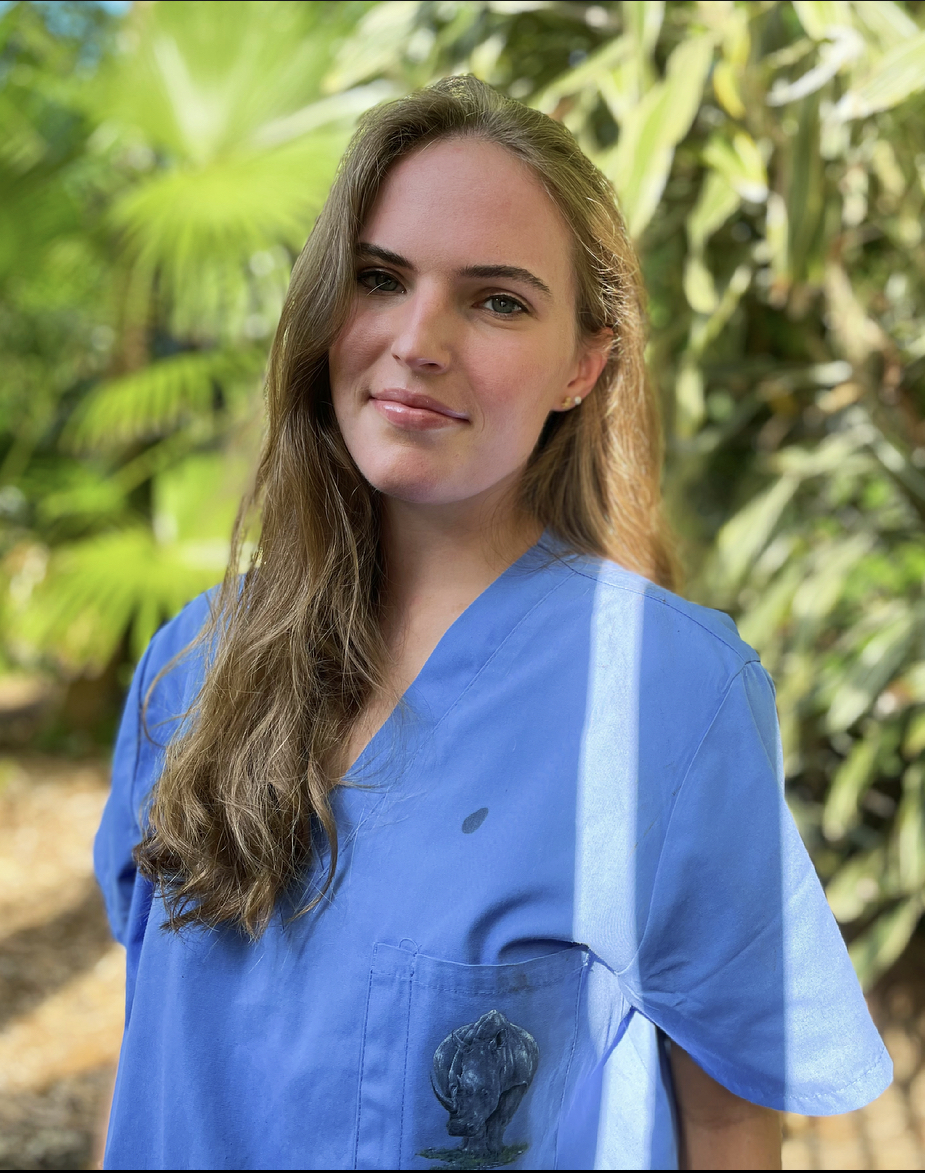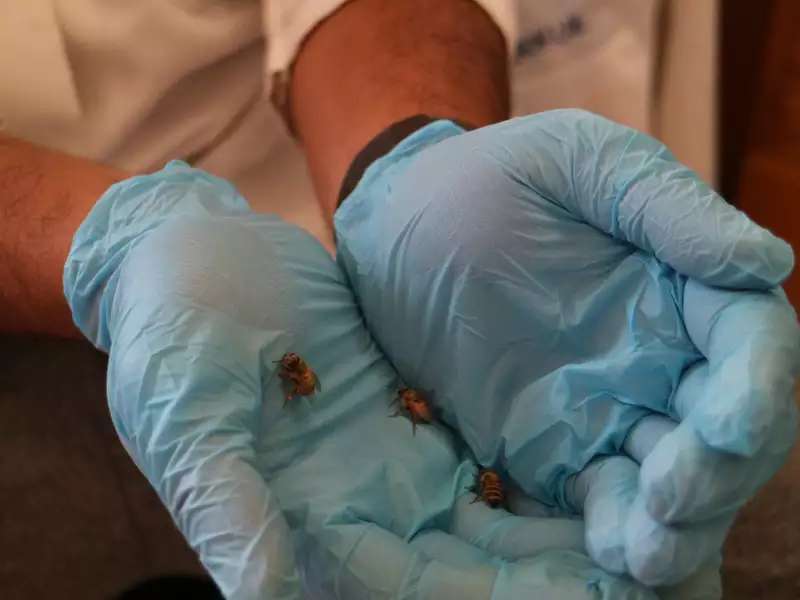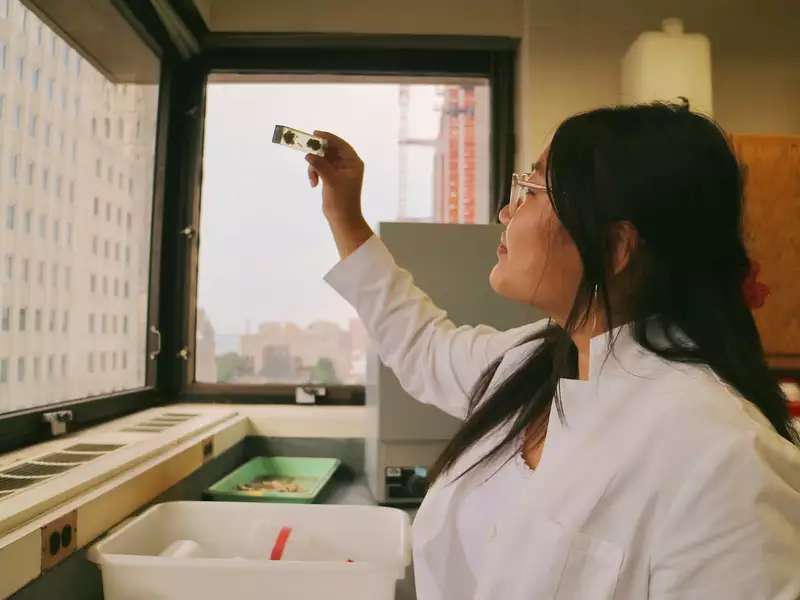1. Tell us a little bit about yourself.
Theyjasvi Ashok: I am General Biology major also pursuing an East Asian Studies Minor. I'm from Westport, CT and outside of academics, I am a part of Columbia GLOT (a linguistics and language club) and the Athena Pre-Law Society.
Joy Barrett: I entered Barnard Fall 2016 from San Francisco, CA and graduated in 2020 with a degree in Cellular and Molecular Biology. When I wasn’t fulfilling pre-medical requirements, I spent my time planning and coordinating the details for the Bacchanal undergraduate spring concert. I am currently working as a research assistant at NYU Langone in the Plastic Surgery Department, where we have ongoing projects focused on skin regeneration and development, as well as disease models.
Nina Kalkus: While at Barnard, I was an Environmental Biology major. I am from Lawrenceville, NJ. Outside of academics, I was in Sigma Delta Tau, on the CU Dance Team, and was a Nightline Peer Listener. Currently, I am a first-year at University of Pennsylvania School of Veterinary Medicine. I worked as a vet nurse in Miami for two years as well as did zoo hospital shadowing and non-human primate behavioral research between Barnard and vet school.
2. Could you all summarize what your recent publication was on and why your work is significant?
Codons are 3-letter coding sequences involved in the process of creating amino acids for proteins, otherwise known as translation. There is a functional redundancy to codons, as multiple codon combinations can encode for the same amino acid. This redundancy has led to codon usage bias, which occurs when some codons are preferentially selected over the other synonymous counterparts that encode the same amino acid. In our project, we studied the codon adaptation index (CAI), which is the calculated value of codon usage bias over time as the codons within a gene continue to undergo selection.
psbA is a highly expressed chloroplast gene which encodes the important photosynthetic protein DI. psbA exhibits uniquely high CAI values, which we were able to calculate by inputting an ancestral reference psbA gene sequence into a computational simulation that introduces random mutational changes to mimic evolution. This simulation showed that the psbA gene of current flowering plant species demonstrate high CAI values, suggesting that there is selective pressure for codon adaptation of psbA. However, additional highly expressed chloroplast genes such as rbcL, psaB, and psbD do not show the same patterns of high CAI values in current flowering plant species; rather, there is a large amount of variation for some of these plant species in terms of CAI values. While these species are not under selective pressures for codon adaptation, their variation does suggest that they are under some form of selective pressure—likely for other important processes upstream of translation in the central dogma, such as mRNA secondary structures or regulatory sequences.
Ultimately, our investigation into psbA and other highly expressed chloroplast genes is not only impactful in terms of understanding the over-selection process within plant species, but also relevant for agricultural purposes, as there is potential to manipulate important genes for crops and flowering plant species.
Being in project lab was such a special time for me during my junior year of college. It was the one class where I felt I could try anything, regardless of whether my creativity led me to a mistake or to something of value (thanks to Professor Morton for fostering that kind of community!). As someone currently working in a research setting, that knowledge has befitted me with a level of confidence for learning and critical thinking that I wouldn’t trade for the world. In fact, being in project lab gave me the faculties to do the coding and computational analysis presented in our publication, without having any computational experience prior.
3. What have you valued most about your experiences in Project Lab? Do you have a favorite memory?
NK: Learning how to code! Professor Morton was incredibly patient with me as this was my first coding experience. My favorite memory was a lunch break we had with the Mansfield lab, sitting in Riverside park having a Morton-Williams picnic; a pleasant break from work and really demonstrated how much the mentors cared about us outside of just lab work.
JB: Being in project lab was such a special time for me during my junior year of college. It was the one class where I felt I could try anything, regardless of whether my creativity led me to a mistake or to something of value (thanks to Professor Morton for fostering that kind of community!). As someone currently working in a research setting, that knowledge has befitted me with a level of confidence for learning and critical thinking that I wouldn’t trade for the world. In fact, being in project lab gave me the faculties to do the coding and computational analysis presented in our publication, without having any computational experience prior.
My favorite project lab memory would have to be when we presented our findings as a group at the end of the year, and then later going out to celebrate with Professor Morton. Throughout my time in the class, the people I worked with became a very cohesive and close unit—it was nice to be able to accomplish our goals as a team.
TA: I really valued getting to think about code in a biological context because I had never done that before. It was really cool to see how we could use code as part of our experiments or to analyze our data. I remember feeling really comfortable working with Professor Morton too because he was really flexible and patient with me. He found a really good balance between challenging me, but also making sure that he didn't overwhelm me, and he was always available to answer my endless questions and work through even the smallest roadblocks with me. I can't pinpoint a single favorite memory, but I especially enjoyed just chatting with both Professors Morton and Mansfield and getting to know them. It really showed how they take an interest in their students for more than just the work they do.
4. What advice would you give a student interested in taking Project Lab?
JB: Take the class! Don’t be afraid to be in a more intimate setting where you can really be seen, even if that is a little bit out of your depth. There is a wide variety of topics covered in the class in addition to your personal project, and therefore it is absolutely worth participating in for the skills you develop and the people you meet.
TA: Don't be afraid! Even if you have no coding experience at all, Professor Morton is incredibly patient and will explain things to you as many times as you need and guide you through your work. By the end of the class, you'll have learned how to code before you even know it, while learning some really cool biology along the way too!
NK: Go for it! Especially if it’s something you are uncomfortable with; the Barnard bio professors in general are incredibly supportive and will help you learn along the way. You never know what will strike your passion, or just be a good skill set for the future.
Research is all about encountering challenges, but more importantly it teaches you how to overcome them, mostly through patience and speaking up for advice.
5. Have you encountered any challenges while conducting research? Would you do anything differently?
NK: Coding itself was a huge challenge for me; I wouldn’t change a thing though because of Professor Morton. I would not have been able to write that code on my own in any capacity. The best way to learn a difficult new skill is to have a patient, knowledgeable mentor, which I was so fortunate to have.
JB: Constantly. Research is all about encountering challenges, but more importantly it teaches you how to overcome them, mostly through patience and speaking up for advice. I wouldn’t change the long days I spent combing through code, or the many re-runs of PCR that I had to do, simply because allowing for those mistakes has led me to become a better researcher.
6. Lastly, any final thoughts you'd like me to highlight?
TA: Any type of research work, even if it isn't wet lab work, is always really valuable and will teach you a lot of transferable skills that could help you in places you might not expect! Anyone who would like to contact me can reach out to the department administrator, Melissa Flores (mflores@barnard.edu), and she'll put us in touch; I'd be more than happy to talk!
JB: The Barnard Biology department is a wonderful place to situate yourself if you have interest in the field, no matter how small. The faculty are supportive, and you will take away so much regardless of the kind of research you perform, be it clinical or basic.
NK: No matter how niche the project seems, research experience is always valuable and can be a huge asset to your future and a great time. Students are welcome to contact me at akalkus@vet.upenn.edu.





